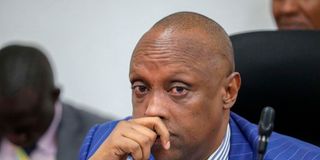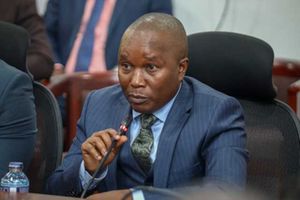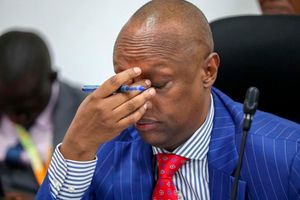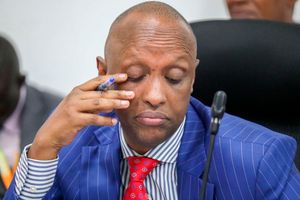
Isiolo Governor Abdi Guyo when he appeared before the Senate in Nairobi on November 14, 2024.
Forged Hansard records, contempt of court and a defective impeachment resolution saved the day for Isiolo Governor Abdi Guyo, as senators voted to throw out an impeachment trial against him on a technicality.
After prolonged preliminary arguments and counterarguments, the Senate delivered a verdict that the impeachment process is just as important as the outcome.
Some 31 senators voted to terminate impeachment proceedings against him after agreeing to uphold preliminary issue raised by the governor's legal team that Isiolo County Assembly did not hold any sittings leading to his impeachment.
12 senators voted against the motion.
With tension mounting as the day gave way to night, senators voted to uphold preliminary objections raised by Governor Guyo’s legal team.
Missing sittings, missing proof
The objections stated that the Isiolo County Assembly had not held any sittings on June 18 and 26, 2025, which culminated in the governor’s impeachment.
In light of a court order declaring the resultant impeachment resolution null and void, the Senate ruled that it could not proceed with the impeachment hearing.
Although senators were divided on whether to reject or uphold the preliminary objections, a majority agreed that proceeding with the trial would amount to a miscarriage of justice.
“I am very clear in my mind that there has been a tacit concession by the Assembly that there was no sitting. There is also a court decision rendering any such sitting null and void. It would be the darkest day if we disobeyed court orders,” said Nairobi Senator Edwin Sifuna
“I am very clear in my mind that there has been a tacit concession by the Assembly that there was no sitting. There is also a court decision rendering any sitting null and void and so, it will be the darkest day if we disobey court orders,” said Nairobi Senator Edwin Sifuna.
Vihiga Senator Godfrey Osotsi said there is no way the Senate should continue to listen to a motion that is a nullity.
“We cannot violate the law because in this case, there was no sitting. We are asking for video recordings but we cannot be given the same. We need to send the assembly back to do the right job and bring back a proper impeachment motion,” said Mr Osotsi.
Kirinyaga Senator James Murango echoed his counterpart’s sentiments, saying the Senate will only be relevant if it upholds the law.
“The process is just as important as the reason for removing a governor. The reason is what you have but the process is in the preliminary objection. How could you think you could come here and pull the rag under our feet?” posed Kakamega Senator Boni Khalwale.
Makueni Senator Dan Maanzo added that the issue of impeachment of a governor is very critical with far reaching consequences and therefore the law must be followed to the letter.
“Let us agree that there is no meeting that happened on the two days and if it happened, they should have given us the audio or video of the proceedings. We are not being unfair or denying anyone justice,” said Tana River Senator Danson Mungatana.
Majority Leader Aaron Cheruiyot had pleaded with the House to proceed to full trial to ensure justice for Isiolo residents.
“I strongly hold the view that for us to serve justice for Isiolo people, we must give a chance to listen to them. The decision is ultimately yours but I want to plead with you that the issues are not as light as some people want to make them seem.”
Mandera Senator Ali Roba added: “I see no harm for the Senate to listen to the substance of the case and make a determination after all the evidence has been adduced. What we are trying to do is to kill the case before it even starts.”
"Phantom" impeachment arguments
Setting the ground for the saving of the first term governor, Mr Guyo’s legal team, led by former Law Society of Kenya (LSK) president Eric Theuri tore into the case by the Isiolo County Assembly, describing the impeachment as “phantom”.
Poking holes into the salient gaps and schemes in their two-limb preliminary objection, Mr Theuri urged the Senate not to entertain the defective impeachment resolution but reject the same, saying the impeachment has put the Constitution and the Senate on trial.
He maintained that no sittings happened on June 18 and 26, a position buttressed by Mr Elias Mutuma, another of Governor Guyo’s lawyers, who added that it is their belief that no proceedings took place in the two days.
“This is an affront on the Constitution and sets a dangerous precedent where the speaker and some few members can attempt a coup on a governor,” said Mr Theuri.
Citing a defective Hansard, special sitting notices and invitation of the governor, the ex-LSK boss said the open, obvious and blatant contradictions and anomalies in the records presented by the Assembly are major indicators of not only misrepresentation but that the documents have been “cooked and generated outside the assembly”.
Mr Elisha Ongoya termed the Hansard of the Isiolo County Assembly a mere piece of paper without a stamp rendering the impeachment invalid.
“We urge the Senate to review the materials we have provided and to find there was no sitting of the Assembly that gave rise to the resolution that is before you for consideration,” said Mr Theuri.
“If this House was to find there was no sitting of the Assembly, then we cannot proceed with the hearing of the impeachment motion. The issues we have raised satisfy the threshold and we invite the Senate to look at the facts provided by the assembly and agree with us that this is a phantom impeachment,” he added.
Mr Ongoya went on to argue that there is no valid or competent motion to sustain an impeachment hearing, as the resolution before the Senate had been declared null and void by the court and therefore has no legal consequence.
He called on the Senate to down their tools in the absence of a valid impeachment motion as the validity of such a motion is an important process in carrying out an impeachment.
“A court of law found the motion as null and void and it therefore has no legal consequence. It is now upon the Senate, once informed of the orders, to determine whether to proceed with the hearing or not. It is a choice between anarchy and Constitutionalism,” said Mr Ongoya.
Assembly's rebuttal
But in their rebuttal, the Assembly led by Mr Paul Nyamodi said the issues raised by the governor should not be considered as a preliminary objection but should be tested by way of cross-examination before the House determines whether the issues hold any water.
Insisting there were two sittings, he said that the fact on the threshold not being met is contested and cannot form the basis for a preliminary objection and therefore the House should proceed to full trial for determination to test the statements of the witnesses.
“The argument is self-defeating because it is the two proceedings that the governor has taken to a High Court in Meru for direction. It cannot be that the governor is now saying there were no proceedings,” said Mr Nyamodi.
“We persuade the Senate to proceed with the impeachment hearing because the statements made before you are not preliminary issues. My suggestion is that the preliminary objections be dismissed and the governor given the chance to try the issues during the full trial,” he added.
Mr Boniface Mawira, the assembly’s lawyer, added that the question of the validity of an impeachment is reserved for the Judiciary at the opportune time, urging the Senate not to accede to the request to take away its jurisdiction on the important matter.
“No order of a court can stop this House from conducting its business; the issues of sitting of the assembly and alleged fraud and forgery are matters that belong to the full trial. It is for the governor to prove, through evidence that is going to be tested through evidence during the full trial, that there was forgery,” said Mr Mawira.
But in their rejoinder, Mr Mutuma dismissed the rebuttal, saying the assembly had misunderstood the nature, extent and effect of their preliminary objection.
“The county assembly is bringing you a dead body in the name of a dead motion and expecting you to invoke your powers. We dare submit that it is not even a dead motion but a still birth because it never got to be born. It was never debated and never resolved to remove the governor,” said Mr Mutuma.
He said it is the duty of the county assembly to establish that indeed a sitting took place, and that rests with the provision of a credible Hansard.
“Documents speak for themselves and we don’t need a witness to take a stand to interpret Hansards which is supposed to communicate what transpired verbatim. Their own Hansards don’t demonstrate a likelihood of a sitting having taken place and therefore investigate whether that motion has met that threshold,” he said.
During clarification, senators wanted both teams to prove whether there were sitting, audio and video records of the Hansard, where the sittings happened, and public participation was conducted.
Senator Mungatana asked whether the assembly appealed the court ruling declaring the impeachment null and void.
Nominated Senator Esther Okenyuri wanted to know whether the sittings happened and in a gazetted place.
“Was the Hansard provided of proceedings conducted in the county assembly or outside?” posed Ms Okenyuri.








